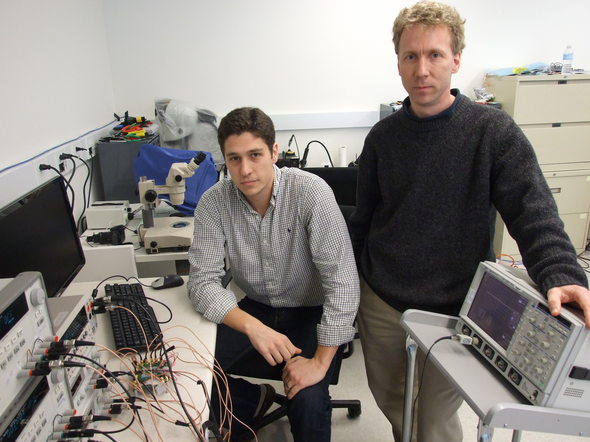U-M microcontroller spinoff Ambiq Micro wins $250,000 from Cisco, venture capitalists

Ambiq Micro cofounders Scott Hanson (left) and David Blaauw say the company's microcontroller technology is significantly more energy efficient than technology currently available on the market.
Nathan Bomey | AnnArbor.com
Ambiq Micro, which spun out of the University of Michigan five months ago, won an industrial business plan competition, giving the startup access to $250,000 in funding from tech giant Cisco Systems and California venture capital firm Draper Fisher Jurvetson, officials announced today.
The accomplishment is a key validation of Ambiq Micro's energy-efficient microcontroller technology, developed at U-M's College of Engineering. It also means that the company now has a direct line to deep-pocketed investors who already understand and believe in the technology's potential.
Ambiq Micro was among 16 finalists competing in the Global Business
Plan Competition, which was judged by DFJ investors and Cisco
executives.
The competition measured the market potential, business strategy and funding plans of the competing companies, which all started as student-led ventures.
"It was difficult to choose a winner, but Ambiq Micro has an impressive technology and team to pursue what is a very interesting market," said Hilton Romanski, vice president of corporate development at Cisco, in a statement. "As more and more of our daily activities -- work, entertainment, learning, commercial transactions -- are carried out with the help of ever-smaller and ubiquitous computing devices, low-power utilization will be crucial to sustain cost and performance. Ambiq Micro's silicon technology helps enable this."
The microcontroller technology improves the power performance of
electronics that spend most of their time in "sleep mode."
It could have applications in a variety of devices with extremely small sensors, including next-generation credit cards, implanted devices and high-tech pharmaceutical labels.
Ambiq Micro CEO Scott Hanson told AnnArbor.com in a recent interview that the device would be manufactured in Taiwan. But he still projected that the company could have 30 employees in Ann Arbor within four to five years. He said the microcontroller is 25 to 130 times more energy-efficient than currently available technology.
"We're seeing a lot of enthusiasm from potential customers and potential companies, and they're all very excited to start working with us," Hanson said.
Many companies in the semiconductor industry need enormous amounts of capital to get their technology to the market, but Hanson said Ambiq Micro will be different.
"The reality of today's market has suggested we need to be far more capital efficient," he said.
Hanson, a post-doctoral fellow at U-M, cofounded the company with U-M professors David Blaauw and Dennis Sylvester. Blaauw said the university had conducted about six years of research before reaching the stage where the device was marketable.
Contact AnnArbor.com's Nathan Bomey at (734) 623-2587 or nathanbomey@annarbor.com. You can also follow him on Twitter or subscribe to AnnArbor.com's newsletters.

